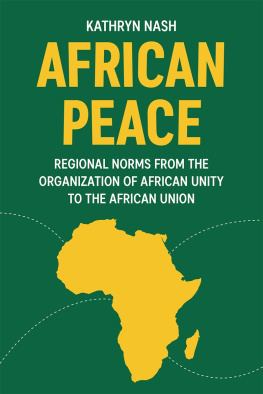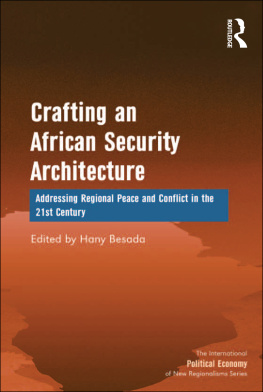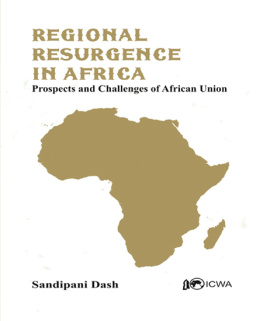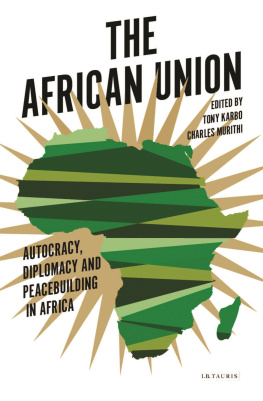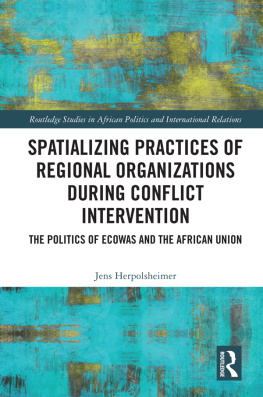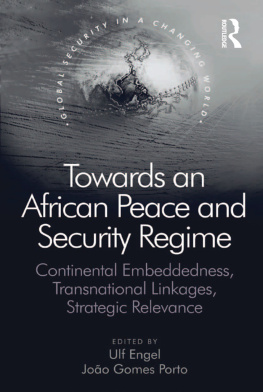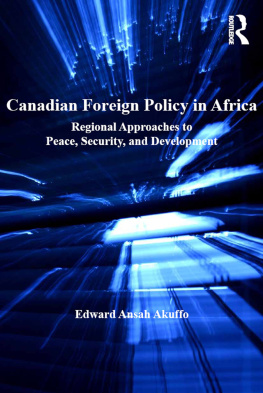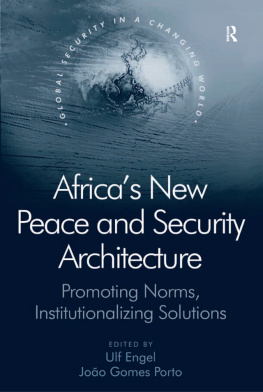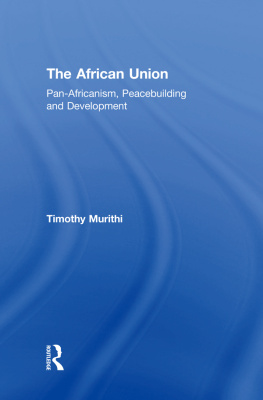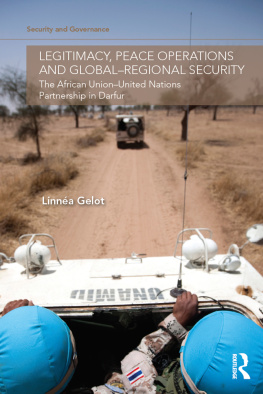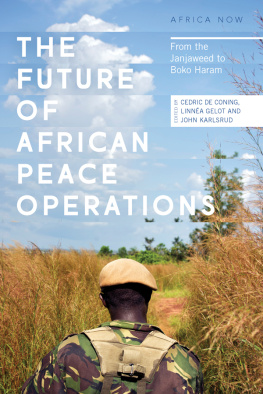African peace
Regional norms from the Organization of African Unity to the African Union
Kathryn Nash
MANCHESTER UNIVERSITY PRESS
Copyright Kathryn Nash 2021
The right of Kathryn Nash to be identified as the author of this work has been asserted by her in accordance with the Copyright, Designs and Patents Act 1988.
Published by Manchester University Press
Altrincham Street, Manchester M1 7JA
www.manchesteruniversitypress.co.uk
British Library Cataloguing-in-Publication Data
A catalogue record for this book is available from the British Library
ISBN 978 1 5261 5281 7 hardback
First published 2021
The publisher has no responsibility for the persistence or accuracy of URLs for any external or third-party internet websites referred to in this book, and does not guarantee that any content on such websites is, or will remain, accurate or appropriate.
Typeset by
Servis Filmsetting Ltd, Stockport, Cheshire
To Mom, Dad, Dustin, Jessica, and Collin
Contents
While researching and writing this book I became indebted to a large number of people. I would like to thank my colleagues at the School of Oriental and African Studies and the University of Edinburgh for their steadfast support and valuable feedback throughout this process. In particular, Leslie Vinjamuri, Stephan Chan, and Christine Bell provided unwavering mentorship. I would also like to thank the entire Political Settlements Research Programme for feedback on earlier drafts of the introduction and encouragement throughout this process. I am particularly indebted to Laura Wise, Robert Wilson, and Sean Molloy, who gave substantial feedback on several drafts, as well as several anonymous reviewers for their constructive and robust engagement with my manuscript. Finally, I would like to thank my editor and the whole team at Manchester University Press, who helped shepherd this work through the publication process.
I collected evidence for this book from the African Union Commission Archives, and I would like to thank Chedza Molefe, Sirak Tesfaye, and Stephen Mayega for their invaluable assistance in facilitating my visit and navigating the archives. They were incredibly hospitable to me and all visiting scholars and ensured I had access to the wealth of material available at the archive. Citations of the archival documents use the title and information as shown on the original document. This does lead to some inconsistency in the formatting of citations but is done to ensure readers can trace the documents used.
I would like to thank the UK Foreign, Commonwealth and Development Office (FCDO) for the funding of my current position as part of the Political Settlements Research Programme at the University of Edinburgh. However, the information and views set out in this publication are mine and do not necessarily reflect the official position of FCDO. Neither FCDO nor any person acting on their behalf may be held responsible for the use of the information contained therein. In addition, some material from Projects edited by Matteo Grilli and Frank Gertis, reproduced with the permission of the editors and Manchester University Press.
Finally, I would like to thank my family and several close friends near and afar, including Jennifer Roggio, Caryl Tuma, Bethany Haworth, and Greg OKeefe, for their support through the long process to research, write, and publish this volume.
| ALF | African Leadership Forum |
| AMIB | African Union Mission in Burundi |
| AMIS | African Union Mission in Sudan |
| APSA | African Peace and Security Architecture |
| ASEAN | Association of Southeast Asian Nations |
| CAR | Central African Republic |
| CSSDCA | Conference on Security, Stability, Development and Cooperation in Africa |
| ECOMOG | Economic Community of West African States Monitoring Group |
| ECOWAS | Economic Community of West African States |
| FLN | Front de Libration Nationale |
| ICC | International Criminal Court |
| ICISS | International Commission on Intervention and State Sovereignty |
| NATO | North Atlantic Treaty Organization |
| NGOs | non-governmental organizations |
| OMIC | Observer Mission in the Comoros |
| PSC | (AU) Peace and Security Council |
| R2P | Responsibility to Protect |
| RPF | Rwandan Patriotic Front |
| SADC | Southern African Development Community |
| SMC | Standing Mediation Committee |
| UDHR | Universal Declaration of Human Rights |
| UNAMIR | United Nations Assistance Mission for Rwanda |
| UNDPKO | United Nations Department of Peacekeeping Operations |
| UNECA | United Nations Economic Commission for Africa |
| UNITAF | Unified Task Force |
| UNOSOM | United Nations Operation in Somalia |
| UNPROFOR | United Nations Protection Force |
| UNSC | United Nations Security Council |
Who contributes to the ideas or norms that govern the international system? The literature has explored the role of norm entrepreneurs, international institutions, courts, transnational networks, and states to create and promote norms that set expectations for how global society should work.1 However, there is often a piece of the puzzle that is missing. Regional organizations have defined regional priorities, created norms and policies, and contributed to international norms. Yet, despite their impact at both the regional and international levels, the contributions of regional institutions as norm creators and promoters, particularly in marginalized regions, is under-examined. This book analyzes how African regional organizations created peace and security norms in order to better understand the role regional organizations play in shaping international society. It argues that the Organization of African Unity (OAU) and then the African Union (AU) uniquely adapted existing international norms as well as created new peace and security norms within their regional sphere and largely independent of international pressure.
Norms are collective expectations for appropriate behavior.2 They are vital because they can provide legitimacy in the international system. They can prescribe standards, and they can be both an instrument of power and an obstacle to its use.3 For instance, norms can constrain power by limiting the types of weapons that can be used in war.4 But they can be an instrument of power when they are used to promote a system that is beneficial to certain actors. While it is important to understand how powerful states have created and used norms to enhance and maintain power, it is equally important to investigate how norms have been created and used by less powerful actors. This volume not only explores the specific processes and strategies used by African regional organizations to create norms but also how African regional bodies then used their norms to enhance African legitimacy and power. In examining these issues, this book illuminates the influence of regional organizations in the Global South and adds to an emerging and overdue literature on the global governance contributions of these organizations.5 It also contributes to our understanding of norm creation within the specific spaces of regional organizations. As such, it has implications both for the role that regional organizations play in shaping norms in their own spheres and also the role they play in shaping and promoting international norms.

